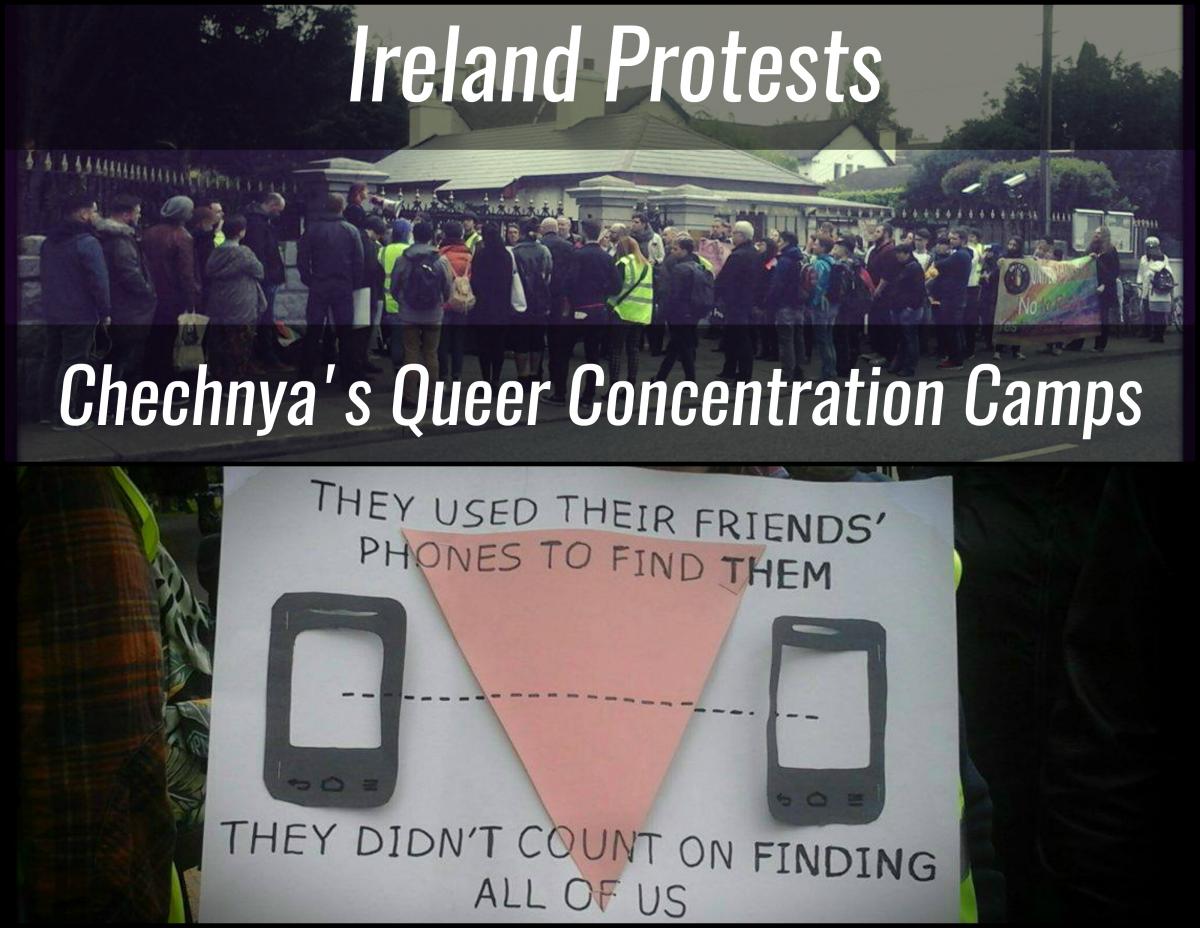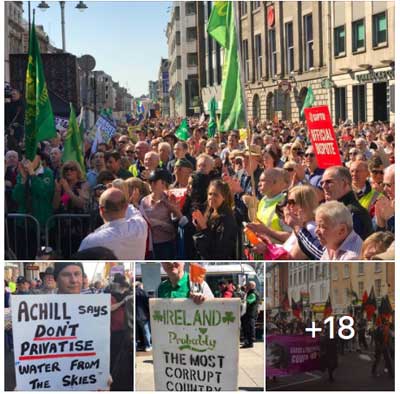Over 30 years of anarchist writing from Ireland listed under hundreds of topics
Our Hospitals: Don't Give the Maternity Hospital to the Nuns - Holles Street Protest!
Protests took place across Ireland Saturday 22nd April to protest the plan by Health Simon Harris to give the new maternity hospital, which will cost 300 million to build, to the same nuns who ran the Magdeline laundaries! The Sisters of Charity ran the Drumcondra and Sean MacDermott Street laundaries where expectant and recent mothers were essentially imprisoned and required to provide free labour that the numns profited from.
Dublin Protests Chechnya's Queer Concentration Camps
On April 20th, a crowd gathered from 4-7pm outside the Russian Embassy in Rathgar, Dublin, to protest the recent campaign of violence against queer men in Chechnya and show solidarity with those under attack and all queer people across the planet (#chechnya100ireland). Gardaí reported that it was the largest ever protest outside the embassy.
show solidarity with those under attack and all queer people across the planet (#chechnya100ireland). Gardaí reported that it was the largest ever protest outside the embassy.
Several placards included the (downwards) pink triangle, a reference to queer men being condemned to Nazi concentration camps. Others read ‘LGBT People Exist Everywhere’, ‘You Can’t Imprison My Sexuality’, and ‘Queer Solidarity Means Migrant Rights’. Demonstrations have also taken place in Amsterdam, Brussels, Lisbon, London, Madrid, Paris, and Vienna. The demo was called by a couple concerned queer women who decided something had to be done - a lesson to us that we don't need to wait for 'Someone Else', a tendency we all have in this passive society.
Yes Duplicity: Irish State, Give Queer Chechens Asylum Now
Angry picket of 100 outside rogue clinic on Dorset street
Over 100 people gathered outside Gianna Care, the rogue ‘pregnancy counselling’ clinic on Dorset Street, to express their anger and disgust after their bogus service was exposed by a journalist, who went undercover as a pregnant woman seeking advice for her crisis pregnancy.
Thousands march to oppose water charges on April 8th in Dublin - with video & photos
 Thousands of protesters converged on Connolly and Heuston stations in Dublin yesterday as part of the 9th national demonstration against the water charges. The demonstration was called by Right2Water, the umbrella group of left wing political parties and trade unions, as part of an effort to pressurise the government to abandon their attempts to implement water charges.
Thousands of protesters converged on Connolly and Heuston stations in Dublin yesterday as part of the 9th national demonstration against the water charges. The demonstration was called by Right2Water, the umbrella group of left wing political parties and trade unions, as part of an effort to pressurise the government to abandon their attempts to implement water charges.
There's Not Enough Time in the Day
There’s not enough bloody time in the day. I find the more my life goes on, the less time I have to live. I wake up around 6am to go to work, and after my commute home, cooking dinner, and attending to other errands, I have 1 hour to myself if I’m lucky. Often by the time I do these basic tasks it’s late enough that I know I’ll be shattered tomorrow and I’ll have to drag myself through the day. After five days I clamber to the shore of the weekend, but often find I’m so drained and conditioned by the work week I’m not myself. It’s a cycle which has no end in sight. Time is constantly on my mind. ‘Can’t do that, not enough time. Sorry, not enough time. Not enough time. I wish I had more time. Where does the time go?’ Checking my phone, what time is it, checking my phone, checking my phone. It does my head in and it’s not going to improve.
5 Reasons to March against the Water Charges Tomorrow – Saturday April 8th
ONE – Because Fine Gael are kicking back and won’t scrap the charges and metering. We’ll force them.
WSM Points of Unity Explained: 1 - Class Struggle and Leadership of Ideas
'1. Anarchism will be created by the class struggle between the vast majority of society (the working class) and the tiny minority that currently rule. A successful revolution will require that anarchist ideas become the leading ideas within the working class. This will not happen spontaneously. Our role is to make anarchist ideas the leading ideas or, as it is sometimes expressed, to become a ''leadership of ideas''.’
We're usually told that class society is a thing of the past. After all, aren't we all middle class now? But this isn't true, and there still very much exists a severe division between people based on property and work, a hierarchy which is a basic fact of the economic system known as capitalism.
WSM Points of Unity Explained: 2 - Power Structures
'2. We reject the idea that society can be changed through 'good people' gaining control of the power structures. This means we reject both the electoral strategy of the social democratic and green parties and the 'revolutionary' strategy of the various left groups.'
The WSM is working towards a free, equal, democratic society. We believe the only way to achieve this is by people taking their destinies into their own hands, forming grassroots mass movements, and creating new truly democratic institutions.
WSM Points of Unity Explained: 3 - Platformism (1)
'3. We identify ourselves as anarchists and with the "platformist", anarchist-communist or especifista tradition of anarchism. We broadly identify with the theoretical base of this tradition and the organisational practice it argues for, but not necessarily everything else it has done or said, so it is a starting point for our politics and not an end point.’
Sometimes a person associates anarchism with chaos, with a complete disinterest in organisation, system building, and regularity. This is a critical misunderstanding of the anarchist project. The WSM practices a form of anarchism which strives to be highly organised and coherent, learning as much as we can from attempts in the past to create a free world.
WSM Points of Unity Explained: 4 - Platformism (2)
'4. The core ideas of this tradition that we identify with are the need for anarchist political organisations that seek to develop:
- Theoretical Unity
- Tactical Unity
- Collective Action and Discipline
- Federalism’
Federalism is an organisational structure based on “the free agreement of individuals and organisations to work collectively towards a common objective”. It is finding the best balance between independence and coherence. This means, for example, that all decisions are made by those affected by them as opposed to centralism, where decisions are made by a central committee for those affected by them. Or that while all WSM branches are united under a common national policy, they can make their own local decisions. It also means that we have no leaders or officials with higher authority than others. Rather, we have 'officers' who are delegated temporary authority to perform certain tasks as mandated by the membership (for instance, to be treasurer).

